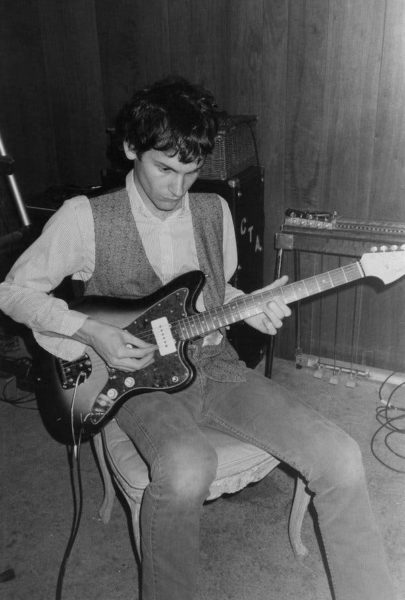Advertisement
The group, which he formed with Hope Sandoval, had a haunting, ethereal sound and a surprise hit with “Fade Into You.”

David Roback, the composer and guitarist for Mazzy Star, a soft-spoken, influential alternative rock group whose 1993 release “Fade Into You” became a hit despite the group’s stated indifference to commercial success, died on Monday at his home in Los Angeles. He was 61.
His mother, Rosemary Roback, said the cause was metastatic cancer.
The music of Mazzy Star, which Mr. Roback formed with the singer Hope Sandoval in the late 1980s, combined his understated guitar playing with Ms. Sandoval’s haunting, enigmatic vocals. Contemporary pop artists like the xx have since embraced a similarly intimate aesthetic.
Mazzy Star released its first album, “She Hangs Brightly,” in 1990. Mr. Roback and Ms. Sandoval played with a shifting lineup of other musicians, including the drummer Keith Mitchell and the bassist Jill Emery.
According to Mr. Roback, mainstream success was not the point.
“It doesn’t matter how well our records do,” he told The San Diego Union-Tribune in 1990. “None of that matters, because we’re completely free.”
Critics lauded “She Hangs Brightly,” which found an audience among alternative rock fans but lacked a breakout hit. That came on Mazzy Star’s sophomore album, “So Tonight That I Might See” (1993), which Mike Boehm of The Los Angeles Times praised as “inward and deep” in a review.
“It seems to flow from the fragmentary consciousness of a mind falling toward sleep during the last sentient moments of an emotionally wearing day,” Mr. Boehm continued. “This is not the rock of the shake and strut, but of the murmur and sigh.”
The album opened with “Fade Into You,” an ethereal ballad that balanced gentle guitar and piano parts with Ms. Sandoval’s reverb-heavy chorus, “Fade into you/Strange you never knew.” The song became a mainstay on MTV and alternative rock radio stations and reached No. 44 on the Billboard Hot 100 chart in 1994.
But Mazzy Star just shrugged at all the attention. The group released another album, “Among My Swan” in 1996, then seemed to go on hiatus. Their next, and last, album did not come out until 2013, when they released “Seasons of Your Day.”
“We never stopped writing or recording,” Mr. Roback told Rolling Stone that year. “We just stopped performing and releasing things.”
He added: “When I’m working on music with Hope, the person that’s foremost in my thoughts is Hope. We tend to get quite caught up in just the making of the music for ourselves.”
David Edward Roback was born in Los Angeles on April 4, 1958, to George and Rosemary (Hunter) Roback. His father was a doctor, his mother a registered nurse. He studied art at the University of California, Berkeley, and formed the band Rain Parade, which included his brother, Steven.
Rain Parade was one of several bands in what became known as the paisley underground, a revival of psychedelic rock in California in the early 1980s. Mr. Roback left the group after it released its first album, “Emergency Third Rail Power Trip” (1983).
In the mid-1980s he founded the group Opal with Kendra Smith, the bassist from Dream Syndicate, and the drummer Keith Mitchell. Opal, which featured Ms. Smith as lead singer and expanded on the paisley underground sound, released the album “Happy Nightmare Baby” in 1987.
That year, Ms. Smith left the band while it was on tour, and Ms. Sandoval replaced her. In time, their collaboration became Mazzy Star.
In addition to his mother, Mr. Roback is survived by his brother; his wife, Hedi (Raikamo) Roback; and a sister, Diane Roback.
Critics compared aspects of Mazzy Star’s sound to earlier groups, like the Velvet Underground and the Doors, and contemporaries like the Cowboy Junkies. Mr. Roback bristled at such comparisons.
“I’ve never even heard the Cowboy Junkies,” he told The Los Angeles Times in 1990, adding: “But then, I don’t listen to a lot of contemporary music. I kind of purposely try to avoid it because I don’t want to be influenced by it. I prefer the Rip Van Winkle approach to art.”
Susan C. Beachy contributed research.
